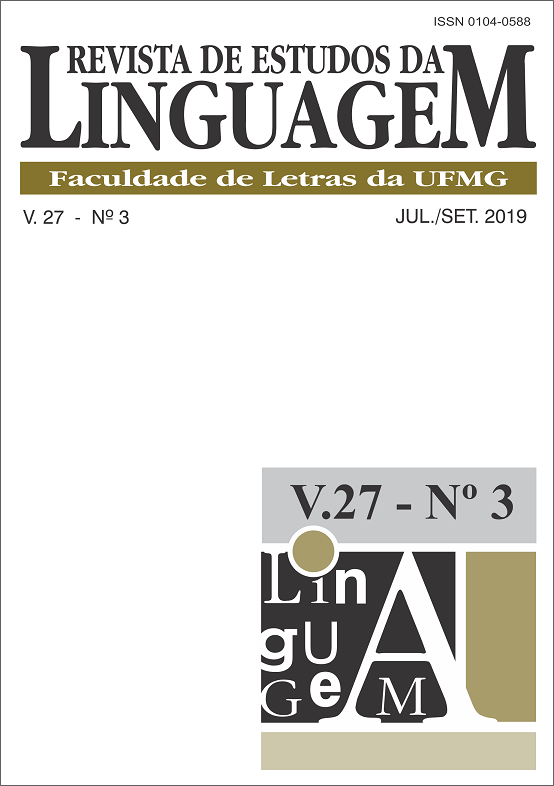O estudo do futuro perifrástico e do futuro sintético com verbos hipotéticos no português brasileiro / The study of the periphrastic future and the synthetic future tenses with hypothetical verbs in Brazilian Portuguese
DOI:
https://doi.org/10.17851/2237-2083.27.3.1313-1344Palavras-chave:
futuro perifrástico, gramática nuclear, gramática periférica, mudança linguística, periphrastic future, nuclear grammar, peripheral grammar, linguistic change.Resumo
Resumo: O uso do futuro perifrástico tem se mostrado como a construção preferencial dos falantes do português brasileiro e apontado como um fenômeno de mudança linguística na língua. Diante disso, esta pesquisa buscou inovar e aprofundar possíveis análises dessa mudança, ao se propor averiguar, a partir de um ponto de vista formal da gramaticalização, a escolha do tempo verbal futuro (simples ou perifrástico) de informantes nativos do português brasileiro diante de verbos hipotéticos. Para cumprir esse objetivo, a metodologia consistiu em aplicar um questionário online com quinze verbos hipotéticos nos tempos futuro simples e futuro perifrástico a informantes brasileiros, maiores de dezoito anos e que tivessem concluído o ensino médio. Os resultados encontrados constataram a presença de uma variação no uso dessas construções, justificada, na ótica deste estudo, pela influência da gramática periférica do falante (nos termos de KATO, 2005). Ainda assim, os indícios de mudança podem ser averiguados na pesquisa, na medida em que mesmo com verbos hipotéticos, a construção do futuro pelo uso da perífrase apresentou um percentual maior de preferência em todos os contextos analisados.
Palavras-chave: futuro perifrástico; gramática nuclear; gramática periférica; mudança linguística.
Abstract: The use of the periphrastic future tense has been shown as a variant in the trajectory of change of Brazilian Portuguese. Several studies have been demonstrating the speaker’s preference for the use of verbal periphrasis in the future tense - eg: vou / irei estudar - in the place of use of the simple future tense – eg.: estudarei. In this sense, this research sought to innovate and deepen an analysis of that change, by proposing to find out, from a formal viewpoint on grammaticalizion, the choice of verbal tense (simple or periphrastic future) of native informants of the brazilian portuguese with hypothetical verbs. The methodology consisted of applying an online form to Brazilian subjects, over 18 years of age and who had completed high school. In relation to the results found, we observe that because it is a written experiment, peripheral grammar (schooling) was present in a quantitative way in our results. However, signs of change in the language can be examined and analyzed, that is, even with hypothetical verbs the future construction in the language is in the way of the implementation of verbal periphrasis. At the same time, it was possible to observe, by studying the contexts, that the synthetic future tense is still present, especially due to the influence of schooling.
Keywords: periphrastic future; nuclear grammar; peripheral grammar; linguistic change.





